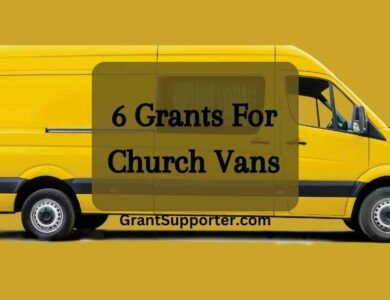9 Grants For Disabled Toilets In Churches: Trusted Sources
As a church leader, I know the importance of providing accessible facilities for our congregation and visitors. That’s why I was thrilled to learn about the free grants for disabled toilets in churches available from trusted sources like the CDBG.
In this blog post, I will share the resources I found helpful during my journey to make my congregation feel welcomed and inclusive.
Free Grants For Disabled Toilets In Churches
Often, churches face the challenge of providing accessible toilets for their disabled members and visitors. This can be a costly and complex project, especially for historic buildings that need to preserve their architectural integrity.
Fortunately, grants from the below-mentioned sources can help churches fund and implement these essential facilities. This post will introduce some of the main grants for disabled toilets in churches and how to apply for them.

1. Community Development Block Grants (CDBG)
CDBG funds can be used as grants for disabled toilets in churches. When a church is involved in a project that provides services to the general public, such as a community center or a shelter, and installing disabled toilets is part of this community-serving project, it can qualify for CDBG funding.
Who can apply: Churches in need of accessibility enhancements
Name of the Grant: Community Development Block Grants (CDBG)
Type of assistance offered: 50% of the cost of replacing bathrooms
How to Apply: You can reach out to the organization to apply
2. Historic Preservation Grants
Historic Preservation Grants can assist churches in installing disabled toilets by providing financial support for renovations that include accessibility improvements.
Who can apply: Churches with historic significance
Name of the Grant: Historic Preservation Grants
Type of assistance offered: Requested amount when found eligible
How to Apply: You can reach out to the organization to apply
3. Rural Development Grants
Rural Development Grants, typically provided by government agencies or nonprofit organizations, are designed to support infrastructure and community development in rural areas.
Who can apply: Rural churches
Name of the Grant: Rural Development Grants
Type of assistance offered: Requested amount when found eligible
How to Apply: You can reach out to the organization to apply.
4. Christian Fund for the Disabled
The Christian Fund for the Disabled (CFD), administered by Joni and Friends, offers free grants for disabled toilets in churches in the United States with the installation of accessible toilets through a matching grant program.
Who can apply: Churches in need of accessibility enhancements
Name of the Grant: Matching Grants
Type of assistance offered: CFD will match the amount allocated by the church
How to Apply: You can reach out to the organization to apply.
Who can apply: Churches in need of accessibility enhancements
Name of the Grant: CFD grants
Type of assistance offered: up to $2,500
How to Apply: You can reach out to the organization to apply.
5. Accessible Faith Grant
The Accessible Faith Grant is sponsored by the Retirement Research Foundation in Illinois. The grant is awarded to churches that can demonstrate a financial need for increasing accessibility for older, handicapped members of their church. Their remodel plans must show that these members would use the new services, programs, and buildings often.
Who can apply: Churches in need of accessibility enhancements
Name of the Grant: Accessible Faith Grant
Type of assistance offered: up to $30,000
How to Apply: You can reach out to the affiliated organization to apply.
6. General Board of Church and Society (GBCS) Grants
The GBCS has a history of providing grants to help churches in the United States increase their accessibility. They believe in inclusiveness, particularly in making church facilities accessible to persons with disabilities.
Who can apply: Churches and groups related to The United Methodist Church
Name of the Grant: GBCS grants
Type of assistance offered: Unspecified
How to Apply: You can reach out to the affiliated organization to apply.
7. National Churches Trust
This trust offers a range of grants for church building improvements, including grants for disabled toilets in churches. They also provide Community Grants to support projects that benefit the local community and improve access.
Who can apply: Churches in need of accessibility enhancements
Name of the Grant: Cornerstone Grant Program
Type of assistance offered: 50% of the project’s total cost
How to Apply: To apply, first read the guidance notes and complete the online application form.
Along with the National Churches Trust, the free grants for disabled access can also prove to be useful while seeking assistance to get disabled toilets installed in your church.
8. Enabling Accessibility Fund
This fund supports the construction of universally designed offices or the retrofitting of washrooms with accessible toilets, grab bars, and taps. It aims to help make facilities more accessible for people with disabilities.
Who can apply: Evangelical churches and organizations for educational purposes
Name of the Grant: Enabling Accessibility Fund
Type of assistance offered: up to $1,500
How to Apply: To apply, first read the guidance notes and complete the online application form.
Who can apply: Evangelical churches and organizations for educational purposes
Name of the Grant: One-time Matching Grants
Type of assistance offered: up to $2,500
How to Apply: First, read the guidance notes and complete the online application form.
9. Disability Ministries of the United Methodist Church
This committee provides funding for accessibility and inclusion projects specifically for United Methodist churches. The grants for disabled toilets in churches are available during an annual cycle, typically from January to March.
Who can apply: Churches affiliated with The United Methodist Church
Name of the Grant: Church accessibility grants
Type of assistance offered: Not specified
How to Apply: First, read the guidance notes and complete the online application form.
Grants For Disabled Toilets In Churches: How to Write a Successful Grant Application
Writing a successful grant application for acquiring funds to install disabled toilets in a church involves careful planning and clear communication. Here are key steps and tips to enhance the likelihood of your application’s success:
- Understand the Grant Requirements
- Clearly Define Your Project
- Demonstrate the Need
- Budget and Financial Information
- Match the Grant’s Mission and Goals
- Include Supporting Documentation
- Impact and Outcomes
- Plan for Sustainability
- Proofread and Review
People Also Ask
Here are the 3 most asked questions regarding grants for disabled toilets in churches.
How much can churches receive from grants for disabled toilets?
Sources offer up to 50% of the project cost, while you can also get a fixed amount. When applying for grants, churches should also consider other costs, such as planning permission, VAT, and professional fees.
What are the challenges of grants for disabled toilets in churches?
The challenges of grants for disabled toilets in churches include finding suitable funding sources, meeting the application requirements and deadlines, obtaining planning permission and building regulations approval, managing the project and contractors, and maintaining the quality and safety of the work.
When can I apply for grants for disabled toilets in churches?
Grants can have specific deadlines throughout the year, while there are grants that accept applications on a rolling basis. You should check the website or contact the grant provider for more information on when to apply.
The Bottom Line
Grants for disabled toilets in churches are available from various sources, such as the National Lottery Heritage Fund, the Church Buildings Council, and local authorities. These grants can help churches to improve their accessibility and inclusivity while serving their communities. You should check the eligibility criteria, the application process, and the deadlines of each funding scheme.



